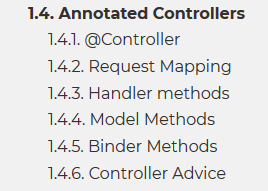spring 官方文档-片段学习总结
片段所在连接:https://docs.spring.io/spring/docs/5.0.4.RELEASE/spring-framework-reference/web-reactive.html#webflux-ann-controller
片段目录:

1.4章节简述
SpringWebFlux提供了一个基于注释的编程模型,其中@Controller和@RestController组件使用注释来表示请求映射、请求输入、异常处理等等。带注释的控制器具有灵活的方法签名,不需要扩展基类或实现特定的接口。
1.4.1 @Controller ,表示一个类是控制器并自动被容器侦测。
@Target({ElementType.TYPE}) #注解的作用目标——接口、类、枚举、注解
@Retention(RetentionPolicy.RUNTIME)#保留至运行时
@Documented #被javadoc工具记录
@Component #视为组件,被容器自动侦测
public @interface Controller {
String value() default "";
}
@RestController ,表示一个类是控制器并自动被容器侦测;将控制器返回的对象通过适当的转换器转换为指定的格式之后,写入到response对象的body区。
@Target(ElementType.TYPE) @Retention(RetentionPolicy.RUNTIME) @Documented @Controller @ResponseBody #将控制器返回的对象通过适当的转换器转换为指定的格式之后,写入到response对象的body区 public @interface RestController { String value() default ""; }
1.4.2 Request Mapping
@RequestMap注释用于将请求映射到控制器方法。它具有按URL、HTTP方法、请求参数、标头和媒体类型匹配的各种属性。
它可以在类级别用于表示共享映射,也可以在方法级别用于缩小到特定的端点映射。
@Target({ElementType.METHOD, ElementType.TYPE}) #注解的作用目标——方法;接口、类、枚举、注解。
@Retention(RetentionPolicy.RUNTIME)
@Documented
@Mapping
public @interface RequestMapping {
String name() default "";#为当前映射指定一个名称,不常用,一般不会指定
@AliasFor("path")#属性的别名
String[] value() default {};#value path 等价
@AliasFor("value")#属性的别名
String[] path() default {};#value path 等价
RequestMethod[] method() default {};#约束映射到的HTTP请求方法;GET, HEAD, POST, PUT, PATCH, DELETE, OPTIONS, TRACE
#根据这些特定方法,分别有RequestMapping的相应变体。
String[] params() default {};#约束请求参数,例如:params = "myParam=myValue" ;处理请求中包含了名为“myParam”,值为“myValue”的请求
String[] headers() default {};#约束请求头,例如:headers = "content-type=text/*"
String[] consumes() default {};#约束请求可消费的媒体类型,例如:consumes = {"text/plain", "application/*"}
String[] produces() default {};#约束请求可生成的媒体类型,例如:produces = {"text/plain", "application/*"}
}
它还有几个HTTP方法的快捷变体(可类比对数据库的操作理解):
-
@GetMapping 查 -
@PostMapping 改增 -
@PutMapping 增 -
@DeleteMapping 删 -
@PatchMapping 用于将HTTP{@code Patch}请求映射到特定处理程序方法的注释【还不理解】
1.4.3 Handler methods
常见的控制器方法参数注解:@PathVariable、@RequestParam、@RequestHeader、@ModelAttribute、@SessionAttributes、@SessionAttribute
、@CookieValue、@RequestBody、@RequestPart。分别举例演示:
@PathVariable
// GET /pets/42
@GetMapping("/pets/{petId}")
public void findPet(@PathVariable String petId) {
// petId == 42
}
@RequestParam
@GetMapping public String setupForm(@RequestParam("petId") int petId, Model model) { Pet pet = this.clinic.loadPet(petId); model.addAttribute("pet", pet); return "petForm"; }
@RequestHeader
/**
模拟请求头
Host localhost:8080 Accept text/html,application/xhtml+xml,application/xml;q=0.9 Accept-Language fr,en-gb;q=0.7,en;q=0.3 Accept-Encoding gzip,deflate Accept-Charset ISO-8859-1,utf-8;q=0.7,*;q=0.7 Keep-Alive 300
*/
@GetMapping("/demo")
public void handle(
@RequestHeader("Accept-Encoding") String encoding,
@RequestHeader("Keep-Alive") long keepAlive) {
//...
}
@ModelAttribute
@PostMapping("/owners/{ownerId}/pets/{petId}/edit")
public String processSubmit(@ModelAttribute Pet pet) { } # ownerId petId 需要和对象Pet的参数key匹配。
@SessionAttributes ,用于类级注解,用来存储请求间的模型数据,同级别的子节点共享数据。
@Controller @SessionAttributes("pet") public class EditPetForm { // ... @PostMapping("/pets/{id}") public String handle(Pet pet, BindingResult errors, SessionStatus status) { if (errors.hasErrors) { // ... } status.setComplete(); // ... } } }
@SessionAttribute,根属性数据,全部节点共享数据。
如果您需要访问全局管理的预先存在的会话属性,即控制器外部(例如,通过过滤器),并且可能存在或不存在,则可以使用方法参数上的@SessionAttribute注释。
@GetMapping("/")
public String handle(@SessionAttribute User user) {
// ...
}
@CookieValue
//模拟cookie JSESSIONID=415A4AC178C59DACE0B2C9CA727CDD84 @GetMapping("/demo") public void handle(@CookieValue("JSESSIONID") String cookie) { //... }
@RequestBody,使用@RequestBody注释通过HttpMessageReader读取请求体并将其反序列化为对象
//@Valid 序列化后对象必须匹配,否则报 WebExchangeBindException,响应BAD_CODE为:400
@PostMapping("/accounts")
public void handle(@Valid @RequestBody Account account, BindingResult result) {
// ...
}
@RequestPart
/** Multipart requests can also be submitted from non-browser clients in a RESTful service scenario. For example a file along with JSON: POST /someUrl Content-Type: multipart/mixed --edt7Tfrdusa7r3lNQc79vXuhIIMlatb7PQg7Vp Content-Disposition: form-data; name="meta-data" Content-Type: application/json; charset=UTF-8 Content-Transfer-Encoding: 8bit { "name": "value" } --edt7Tfrdusa7r3lNQc79vXuhIIMlatb7PQg7Vp Content-Disposition: form-data; name="file-data"; filename="file.properties" Content-Type: text/xml Content-Transfer-Encoding: 8bit ... File Data ... */ @PostMapping("/") public String handle(@RequestPart("meta-data") MetaData metadata, @RequestPart("file-data") FilePart file) { // ... }
1.4.4. Model Methods
@ModelAttribute注释可以在@RequestMapping方法参数上使用,以从模型创建或访问对象并将其绑定到请求。@ModelAttribute还可以用作控制器方法的方法级注释,其目的不是处理请求,而是在请求处理之前添加常用的模型属性。
控制器可以有任意数量的@ModelAttribute方法。所有这些方法都在同一个控制器中的@RequestMapping方法之前调用。还可以通过@ControllerAdview在控制器之间共享@ModelAttribute方法。有关详细信息,请参阅关于Controller通知的部分。
@ModelAttribute方法具有灵活的方法签名。除了@ModelAttribute本身或与请求主体相关的任何内容之外,它们支持与@RequestMapping方法相同的许多参数。